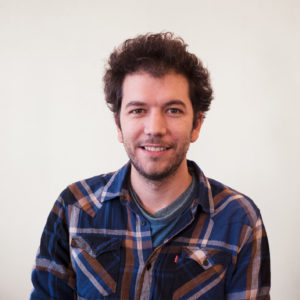As a result of the PI call launched in January 2018, 4 new group leaders joined CENTURI at the beginning of 2019. A focus on these newcomers on the Luminy campus…
Starting in 2017, CENTURI is an interdisciplinary project located in Marseille (France), which federates 15 teaching and research institutes in biology, physics, mathematics, computer science and engineering. Today, CENTURI’s research community is happy to welcome 4 new group leaders: Matthias Merkel (CPT), Jean-François Rupprecht (CPT), Hervé Rouault (CPT – INMED), and Paul Villoutreix (LIS).
Matthias Merkel (CENTURI – CPT)

Matthias graduated from the Physics department of the Technical University Dresden (Germany), where he quickly became interested in theoretical biophysics. He joined Frank Jülicher’s team for a PhD at the Max-Planck-Institute for the Physics of Complex Systems (Dresden) in 2010. Their research project focused on the physics of epithelial deformations as well as planar cell polarity. This period of time also constituted an opportunity for him to work with other teams such as Suzanne Eaton’s team, working on the development of the fruit fly’s wings (Drosophila melanogaster).
Matthias then joined Lisa Manning’s team (Syracuse University, NY, USA) in 2015 for a postdoc project focusing on vertex-type statistical models for biological tissues, and more specifically on the transition from liquid to solid state of these tissues.
« I have realized that interdisciplinary collaborations are extremely beneficial for both sides – both theory and experiment can mutually benefit and fuel each other’s research. »
Matthias Merkel joined CENTURI and the Centre for Theoretical Physics (CPT) in January 2019. He leads the “Self-organization and collective effects in living systems” team which aims to understand under which conditions biological tissues can robustly and autonomously deform in an oriented manner. Matthias’ team is also interested in the behaviour of disordered materials such as the network of flexible fibres that form collagen.
Hervé Rouault (CENTURI – CPT-INMED)

Physicist by training, Hervé Rouault first joined the École Normale Supérieure (Paris) where he graduated from a Master’s degree, before joining Vincent Hakim’s laboratory for his PhD in 2005. During his PhD, Hervé studied specification of animal cell fates among assemblies of cells from a theoretical point of view. This theoretical approach was quickly completed by an experimental approach via a collaboration with François Schweisguth and his team.
« I also tremendously liked the experience of collaborating with experimentalists on a joint project. It is an effective way to generate new successful ideas in the different fields of research it emanates from. »
He continued to work with François Schweisguth on cell differentiation patterns before joining the Janelia Research Campus (USA) for a postdoc in 2012, during which he deciphered the nature of the neural activity of an internal compass that the fly is using to orient itself while navigating.
« I expect to help foster new collaborations between the Centre of Theoretical Physics and the Inmed. »
Hervé has now joined CENTURI and is affiliated to the CPT and the INMED where he leads the “Neural networks for the representation of 3D environments” team. A project combining the theory of recurrent neural networks and machine learning, with the objective of deciphering the neural networks that support our persistent representations of space.
Jean-François Rupprecht (CENTURI – CPT)

Hailing from the French Alps, Jean-François Rupprecht has long been passionate about astronomy. A passion and curiosity for science that would lead him to the École Normale Supérieure and a master in Theoretical Physics. Reading an interview of Steven Weinberg (Physics Nobel 1979) saying:
“My advice is to go for the messes – that’s where the action is.”
Jean-François decided to specialize in Statistical Physics. He then continued his studies in 2012 with a thesis under the supervision of Raphael Voituriez and Olivier Bénichou at University Pierre et Marie Curie (Paris VI), where he worked on random research processes. In parallel with his thesis, Jean-François was also working on a project focusing on cell motility and more precisely on the behaviour of isolated cells. A project that led him to collaborate with the biologists who organised the first World Cell Race.
Jean-François’ involvement in various research projects involving statistical physics and biology led him to join Jacques Prost’s team at the Mechanobiology Institute (Singapore) in 2015 where he studied the theory of active gels.
Jean-François has now joined CENTURI and the Centre for Theoretical Physics (CPT) to create the “Out-of-equilibrium Mechanics” (OM) team.
Paul Villoutreix (CENTURI – LIS)

Paul Villoutreix’s career began with studies in applied mathematics at CentraleSupélec. Interested in research, Paul joined the Master of Life Sciences at the Centre de Recherche Interdisciplinaire (CRI, Paris). An experience during which he discovered a field of research that still fascinates him to this day: embryogenesis.
« I have always been fascinated by many fields of science and I think that I can easily change perspective on a topic, which is what we do when we pursue interdisciplinary research. »
Following his Master’s degree, Paul joined the CRI PhD program in 2011. Under the supervision of Nadine Peyrieras (Bioemergences, Gif-sur-Yvette) and Giuseppe Longo (Ecole Normale Supérieure, Paris), Paul studied randomness and variability during animal morphogenesis with a multi-scale approach combining applied mathematics, developmental biology and epistemological approaches.
His PhD led him to work for a semester with Gunnar Carlsson in the Department of Mathematics at Stanford University (USA).
It was during a Gordon Research Conference that Paul met Stas Shvartsman (Princeton University, USA), professor of chemistry and biological engineering, with whom he completed in 2017 a Postdoc focusing on mathematics used in Data Science and its application to developmental biology issues.
Paul then worked for a year and a half during a second postdoc in Eli Zelzer’s team (Weizmann Institute, Israel) before joining CENTURI and the LIS. He will continue, with the machine learning team (QARMA – LIS), his research combining Data Science and Development Biology.
Learn more about our 4 new group leaders with the extended version of the interviews:
